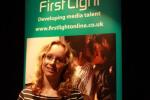I was slightly nervous on the train down to London for my Second Light four-day pre-production documentary course in partnership with Ideastap, Dochouse and BFI. Even though I had applied for the course and been accepted onto it; despite having done my research; and despite having belief in my idea, I was still plagued with one big doubt: ‘Was it good enough to actually be made into a documentary?’!
After four intensive days I left London having answered this question and with a plan of action for how to get my documentary made and seen.
The Secondlight Documentary Pre-production lab was one of the best things I have done, especially since leaving University and entering the big ol’ real world. I am not sure how to fit four days worth of intensive course into a short post but below are some of my highlights:
1) Getting to watch Sarah Gavron’s Village at the End of the World. Thought provoking and at the same time humorous the documentary was a great way to start the course, and even better Sarah stopped by for a masterclass afterwards. It was great to watch the film and then get to question Sarah; from how she came across the subject matter to how many cameras she used, how long filming took to how she got the film funded.
2) Working with Nicola Lees, who gave us all invaluable advice on treatment writing and one-to-one advice on our documentaries. Having Nicola there to help develop our pitches and ideas meant that when it came to pitching at the end of the course we were prepared, and she made me question my ideas with a fresh perspective.
3) Attending the screening of Ken Burns The Central Park Five – a beautiful example of just how powerful documentary can be.
4) Being given masterclasses by industry professionals, and being able to quiz them about anything and everything. It’s always inspiring to know that many of them started off in the same shoes as you.
5) Working with Amber Dobinson and Rachael Swindale and of course Corinna and Alice from the BFI Education department. The support system over the 4days, meant I didn’t feel like I was on a course with strangers, I felt I was in a team of people working together in a trusting environment. You felt that they believed in your documentary and you.
6) Strangely the dreaded pitching was also a highlight of the course. Being challenged to stand in front of industry pro’s Elizabeth Wood, Marc Isaacs and Nicola was a frightening prospect. However, the world didn’t end. I didn’t mess up. (I did stand on one leg! – as Nicola pointed out to me after) But in the end I pitched pretty well. I received positive feedback and knowing that I can now stand up and pitch my documentary to a decent standard in ONE minute makes me feel a whole lot better about the future. Bring on bumping into potential funders in elevators!
For anyone who is thinking of applying for one of these courses, all I would say is. DO IT. The opportunity to meet inspiring people, learn from industry pro’s and push yourself is too big an opportunity to be missed. The most important thing I learnt was that: you have to have belief in your film if you expect anyone else to believe in it.
Cat Marshall
Tags: BFI, DocHouse, Documentaries, film industry professionals, second light, training, Young filmmakers, Young people





